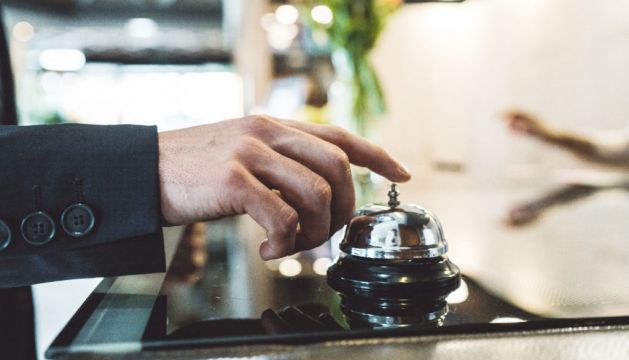A wheelchair user who was given an empty mayonnaise bucket to wash herself during a stay at a hotel in Clare because of a lack of facilities for disabled guests has been awarded compensation of €7,000.
The Workplace Relations Commission ruled that the Killaloe Hotel and Spa in Killaloe, Co Clare had discriminated against the guest, Jacqueline Elliott, on grounds of her disability under the Equal Status Act.
The WRC also directed Flexiteam, the company which operates the resort, to change the hotel’s website by January 31st, 2024 to clearly state what facilities are available for disabled guests and to specifically state that their current rooms are not wheelchair accessible.
It also strongly encouraged the Killaloe Hotel and Spa to review its policy on the non-provision of a room with disabled facilities.
The hotel claimed there had been no conscious or subconscious discrimination of the guest and claimed its general manager had taken all possible steps for the guest by offering to organise alternative accommodation and compensate her.
Dr Elliott said she felt humiliated when a large industrial mayonnaise bucket was shoved through her door at 9pm when she had asked for a basin to use to wash herself.
She told the WRC that she had booked a room at the Killaloe Hotel and Spa on January 22nd, 2023 as a treat for herself and her teenage daughter who is autistic.

Dr Elliott said she had indicated when making the reservation that she required special facilities due to her disability which was confirmed by the hotel’s agent, Pigsback.com.
She also phoned the hotel the day before her planned stay when she was reassured that a room with special facilities was available.
However, Dr Elliott said she was unable to access the bathroom or washing facilities in her allocated room on arrival at the hotel on February 16th, 2023.
She said access to other facilities in the hotel were either blocked or required people or objects to be moved to enable her to access them.
Dr Elliott told the WRC that she would have expected to have access to handrails for using the toilet and having a bath.
She also complained she had to use a “platform” lift which was so small that there was barely room for her daughter and her wheelchair, while they also required the assistance of a hotel receptionist to operate it.
She stated that a public disabled toilet which she was expected to use was at the far end of a corridor from their room.
The corridor also had a fire door which opened inwards as well as having handles that were too high for a wheelchair user to reach.
The WRC heard that the hotel’s general manager, Jibin Thomas, offered Dr Elliott her money back because he did not have an accessible room and said she could stay at another hotel.
She claimed the manager constantly repeated to her what her options were but did not put a physical plan into action.
Dr Elliott claimed the manager was completely oblivious to the ongoing repetitious humiliation he was piling on her.
She added that the hotel had offered her a one-night stay in Sligo, while she had received an offer of €500 to withdraw her complaint to the WRC.
Dr Elliott said her main concern was that another disabled guest would not endure the same situation.
The WRC heard that the hotel promotes itself as having accessible facilities rather than “accessible rooms.”
Mr Thomas expressed regret for the error over the booking which he claimed had been made by a young staff member who had not followed the correct procedure for dealing with guests with special requirements.
The manager said he offered to relocate Dr Elliott and her daughter to a different hotel with accessible facilities as well as to pay for transport and a dinner to compensate them for any difficulty they had experienced.
He also offered them a complimentary breakfast on their return the next morning.
However, Mr Thomas said Dr Elliott decided to stay.
The manager said he later offered them a one-night complimentary stay with meals in a sister hotel, Castle Dargan in Sligo, with fully accessible rooms to show the company’s hospitality as he realised they were not having a good time.
Mr Thomas recalled that after Dr Elliott had requested a bucket to wash herself the following morning , he grabbed the first clean bucket he saw which was a large mayonnaise container and brought it to their room.
He said he e-mailed her the following day to apologise and confirm the offer of a one-night complimentary stay at Castle Daran.
He followed that up with a phone call a few days later when he offered them a stay of three to five nights at the Sligo resort but got no reply back.
Mr Thomas said the Killaloe Hotel and Spa had zero tolerance for discrimination and was extremely apologetic for any distress, upset and inconvenience caused to Dr Elliott.
He claimed he sought to rectify the matter to the best of his ability once he became aware of the matter.
The manager said staff had also received additional training following the issue.
In his ruling WRC adjudication officer, Peter O’Brien, said Dr Elliott had found the facilities at the hotel to be “totally unsuitable, humiliating and upsetting” after it had accepted her booking which had specified that she was a wheelchair user.
Mr O’Brien said the hotel should have immediately informed its guest that they were incapable of hosting her as they did not have the room facilities required.
He accepted that Mr Thomas was genuinely remorseful and apologetic and had made some efforts to resolve the situation but said they did not go far enough.







